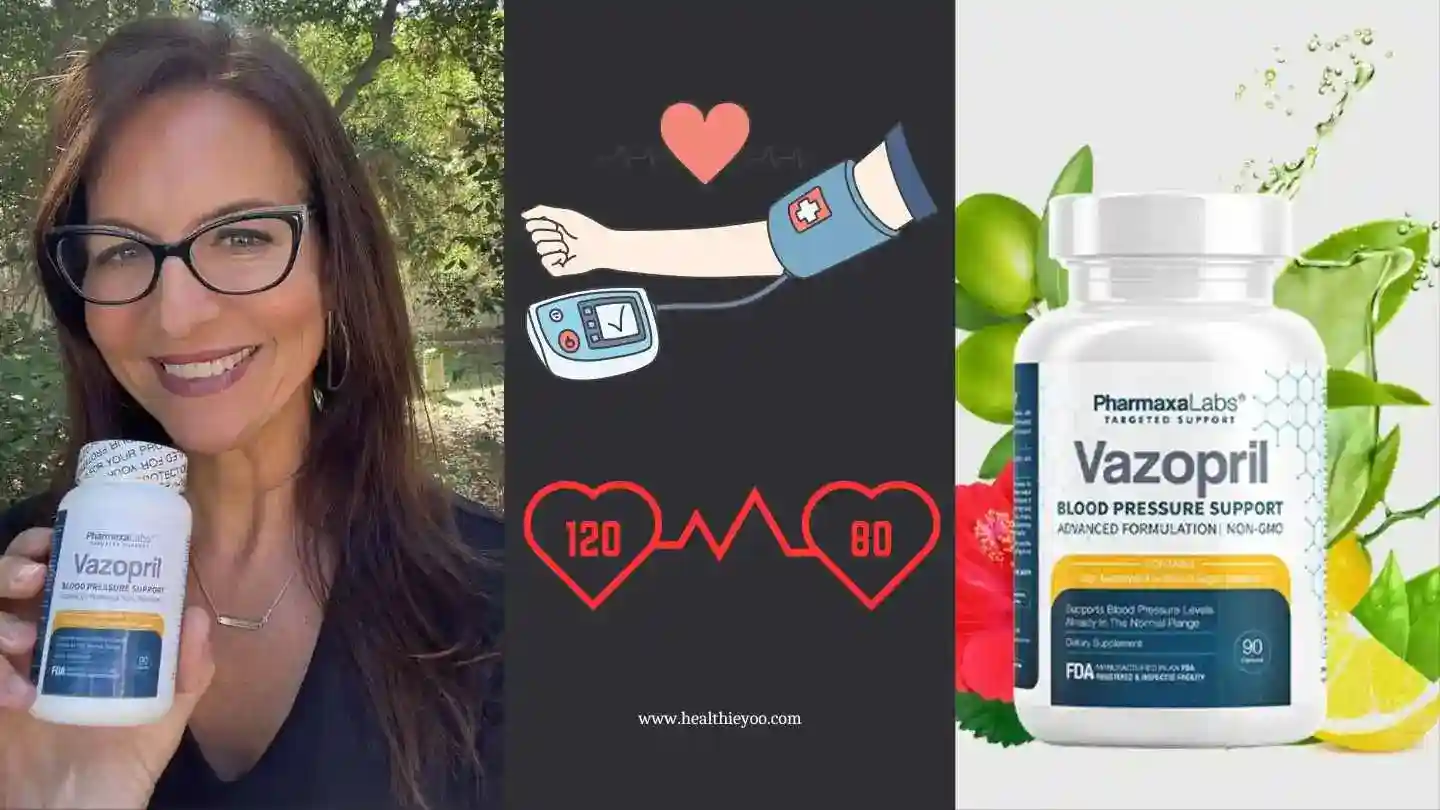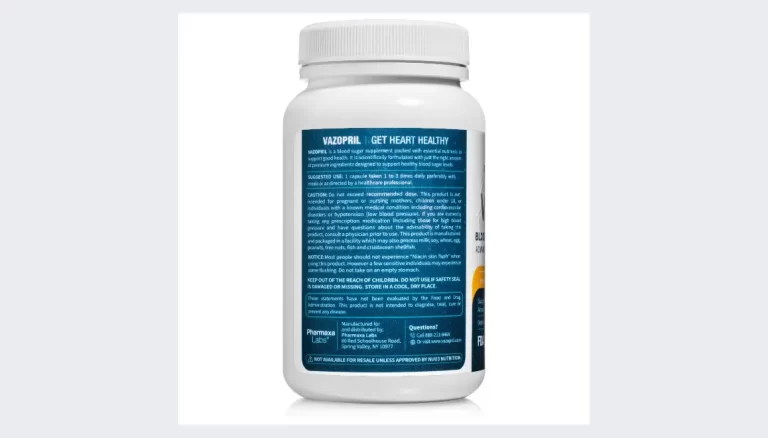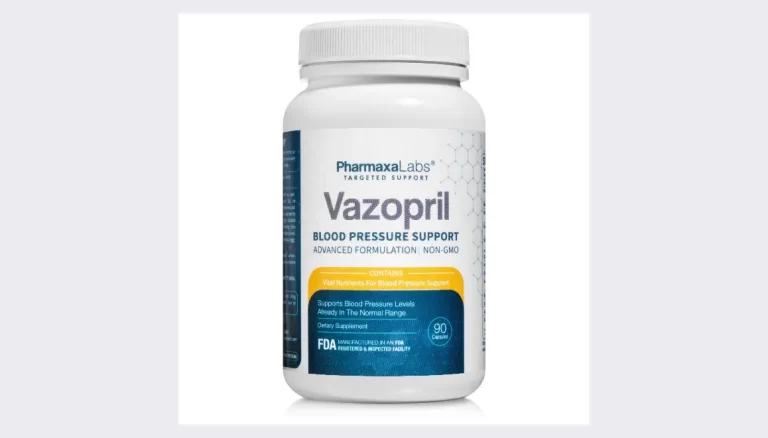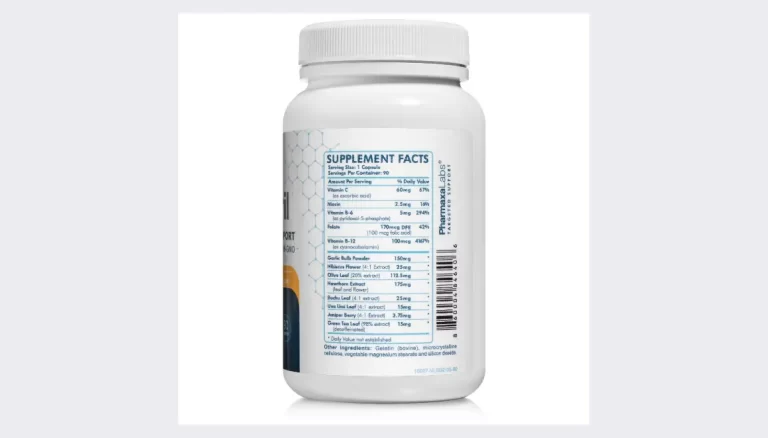High blood pressure or hypertension is one of the most common risk factors for the development of stroke, myocardial infarction, heart failure, and renal failure. In the last few years, Vazopril has become a popular supplement to lower blood pressure. However, Vazopril reviews do not provide effective scientific evidence to support the tall claims. Here in this article, we provide well-researched and evidence-based information to confirm the efficacy of Vazopril ingredients along with a review of Vazopril ingredients for possible side effects to ascertain its safety. The Vazopril reviews of its ingredients could help you judge if the claims made by the company are indeed reliable and whether the ingredients are effective at achieving their intended purpose.
As per the World Health Organization Factsheet, approx.1.28 billion adults worldwide aged between 30-79 years have hypertension (1). The well-known risk factors for hypertension are older age, family history or genetics, chronic kidney disease (CKD), or mostly lifestyle related including being overweight, physically inactive, high alcohol or tobacco consumption, high-salt diet, diabetes, high lipid levels, etc. In addition, males are more prone to hypertension as compared to females.
The upper and lower values of systolic and diastolic blood pressure have evolved over the years. Current ranges of blood pressure as per the American College of Cardiology guidelines are as given below (2):
| Blood Pressure | Systolic Blood Pressure (SBP, mmHg) | Diastolic Blood Pressure (DBP, mmHg) |
| Normal | < 120 | < 80 |
| Elevated | 120-129 | < 80 |
| Hypertension (Stage 1) | 130-139 | 80-89 |
| Hypertension (Stage 2) | ≥140 | ≥90 |
As per WHO, hypertension is diagnosed when the SBP is ≥140 mmHg and the DBP is ≥90 mmHg when it is measured on two different days and comes within this range on both days. SBP is the pressure in blood vessels when the heart contracts and DBP is when the heart rests.
What is Vazopril?
Vazopril is a dietary supplement containing ingredients including certain herbs and vitamins that are especially combined and formulated to help lower blood pressure in a natural way.
In addition to lowering blood pressure, the supplement claims to act fast to reduce low-density lipoprotein (LDL), the bad cholesterol, enhance circulation or blood flow and provide powerful antioxidant action, and strengthen the immune system (3).
Vazopril Ingredients
We looked at the label of the dietary supplement bottle containing capsules and found several ingredients on the label. These are all-natural ingredients comprising vitamins and herbs. The amount per serving and list of ingredients mentioned on the official product is as given below:
Vitamins on Vazopril Label
Vitamin C (as ascorbic acid)- 60mg
Niacin – 2.5mg
Vitamin B6 (as pyridoxal-5-phosphate) -5mg
Folate (100mcg FA) – 170mcg DFE
Vitamin B12 (as cyanocobalamin) – 100mcd
Herbs on Vazopril Label
Garlic Bulb Powder 150mg
Hibiscus Flower (4:1 Extract) 25mg
Olive Leaf (20% extract) 112.5mg
Hawthorn Extract (leaf and flower) 175mg
Buchu Leaf (4:1 extract) 25mg
Uva Ursi Leaf (4:1 extract) 15mg
Juniper Berry (4:1 extract) 3.75mg
Green tea leaf (98% extract) 15mg decaffeinated.
Vazopril Reviews on its Ingredients
As dietary supplements have become increasingly popular over the years, with millions of people relying on them to support their health and wellness, it is crucial to review the scientific evidence on the ingredients of dietary supplements to determine which one is safe and effective for you.
As Vazopril is a popular supplement to lower blood pressure, reviewing the scientific evidence can help increase the transparency of ingredients used in this supplement and can provide better accountability within the dietary supplement industry.
Here we scrutinize one by one each ingredient of Vazopril to let you know if any scientific evidence exists for the claims made. Let us examine Vazopril reviews and each herb and vitamin present in Vazopril for their scientific evidence of efficacy and/or safety or side effects. The major ingredients responsible for lowering blood pressure are the herbs, hence we begin with them.
Reviews on Herbs as Vazopril Ingredients
GARLIC BULB POWDER
Garlic (Allium sativum) has been used since ancient times as a flavoring agent in cooking especially in Asia and also for medicinal purposes including lowering blood pressure.
Efficacy
Several experimental and clinical studies have shown that garlic can help reduce the risk of developing hypertension, diabetes, stroke, and myocardial infarction (4) mainly due to the bioactive constituents present in it. Further, dried garlic powder extract for 4 weeks was demonstrated to reduce systolic and diastolic blood pressure and lipid levels in several clinical trials.
Safety
Vazopril contains garlic bulb powder. As garlic has been safely used in cooking since ancient times, so there is no question about its side effects or safety aspects.
HIBISCUS FLOWER EXTRACT
Hibiscus sabdariffa or Hibiscus, known as ‘Roselle’, or ‘Sour Tea’, is grown in Africa and Southeast Asia, where it is consumed as a tea beverage. Vazopril contains Hibiscus flower extract which reduces blood pressure.
Efficacy
The effects of Hibiscus on hypertension have been verified through several experimental studies supporting Vazopril reviews. Based on the studies, several mechanisms have been proposed by which Hibiscus might lower blood pressure. These include a) reducing calcium entry into vascular smooth muscle cells, b) acting as a diuretic and getting rid of excess salt and water, c) reducing inflammation, and d) inhibiting angiotensin-converting enzyme and reducing angiotensin-II levels. Angiotensin-II is responsible for constriction of arteries and increasing blood pressure. All the above mechanisms of Hibiscus possibly contribute to the lowering of blood pressure.
Safety
A recent meta-analysis recommended taking Hibiscus in chronically elevated blood pressure and confirmed that Hibiscus is indeed safe to consume as part of a balanced diet (5). So, Vazopril will have no evident side effects from this ingredient.
OLIVE LEAF EXTRACT
Olive leaves extract from the plant Olea europaea has been used since ancient times for the treatment of high blood pressure and diabetes. Vazopril contains Olive leaf extract that can possibly help reduce blood pressure and blood sugar levels.
Efficacy
There are several scientific experimental as well as clinical studies that demonstrate the efficacy of olive leaf extract in reducing blood pressure. For instance, in a randomized clinical study, olive leaf extract at 500mg twice daily, reduced the systolic and diastolic blood pressure in patients with Stage 1 hypertension and the effects were comparable to an allopathic drug Captopril (6). Though Vazopril contains Olive leaf extract 112.5mg (and not 500mg), it has several other ingredients that could possibly synergize to produce an effect in lowering blood pressure and improving cardiovascular health.
Safety
The toxicity studies show that olive leaf is safe even at higher doses (7). Hence, Vazopril will have no safety concerns or side effects from olive leaf extract as also discernible from Vazopril reviews.
HAWTHORN EXTRACT (LEAF AND FLOWER)
Hawthorn (Crataegus oxyacantha L) is a well-established and researched cardiotonic herb and is recognized as a medicinal herb in the European Pharmacopeia. Vazopril contains Hawthorn extract which can protect the heart and alleviate high blood pressure.
Efficacy
The extract from the berry and flower is used for the treatment of various cardiovascular conditions such as heart failure, angina, and hypertension (8).
In a randomized clinical trial, it was observed that patients with high blood pressure who received Hawthorn extract showed a significant reduction in diastolic blood pressure and anxiety after 10 weeks of treatment (9).
Additionally, the Hawthorn plant extract has also demonstrated lipid-lowering and blood sugar-lowering properties. The beneficial effects are mainly due to procyanidins, and flavonoids present in the plant (8). Further, it improves blood circulation and has anti-inflammatory properties.
Safety
Hawthorn is generally considered to be safe and even included in European official Pharmacopeia. It is generally advisable not to consume Hawthorn with other drugs used for treating hypertension, angina, or heart failure. Hence, Vazopril may not be best to consume along with other medications used in heart conditions as this may lead to hypotension or low blood pressure as side effects.
BUCHU LEAF EXTRACT
Buchu is traditionally a Southern African plant with medicinal properties. Currently, two species of this plant are widely used, Agathosma betuline Pillans and Agathosma crenulata.
Efficacy
The Buchu plant has been used way back in 1826 as a diuretic for the treatment of genitourinary infections.
It is important to mention here that Diuretics are a class of medication widely used for the treatment of high blood pressure. Diuretics help the kidneys get rid of excess salt and water resulting in reduced total fluid in the blood vessels and reduced blood pressure. The diuretic effects of Buchu leaf thus can be used to effectively lower blood pressure.
Though the Vazopril product label does not mention which of the above two species has been used for the preparation of extract, it does not matter, as both species have been found to be beneficial in lowering blood pressure.
Buchu has demonstrated antioxidant, anti-inflammatory and glucose-lowering actions and is used in diabetes. Though there are not many specific clinical trials, experimental studies have confirmed the efficacy of Buchu in diabetes and hypertension (10). Buchu has widely been incorporated in herbal preparations for blood pressure-lowering effects and for overall cardiovascular health.
Safety
The extracts of two popular species of Buchu, A. betulina and A.crenulata were not found to have side effects at the doses used in Vazopril supporting reviews.
Very high concentrations of the plant were found to be harmful to the liver when tested in rats.
UVA URSI LEAF EXTRACT
Uvi Ursi, Arctostaphylos uva-ursi, is a common medicinal plant in Canada and the United States. It is also known as Bearberry.
Efficacy
The main traditional use of Uvi Ursi or Bearberry was for the treatment of urinary tract infections and as a diuretic. High phenolic content in leaves also contributes to its antioxidant effects. The active constituent is arbutin which has antiseptic and anti-inflammatory actions. These properties of Uvi Ursi make it a useful ingredient in Vazopril to lower blood pressure.
Safety
Uva Ursi is generally considered to be safe and side effects are not common. The allergic reactions to Uva Ursi are not known (11). It is not clear if Vazopril causes allergic reactions.
JUNIPER BERRIES EXTRACT
Juniper berries refer to the fruits or berry-like cones from the plant Juniperus communis L. Vazopril contains Juniper berries that can help lower blood pressure.
Efficacy
The health impact of Juniper berries is enormous. Not only do Juniper berries possess antioxidant, anti-inflammatory, antimicrobial, and neuroprotective actions but they also reduce blood sugar levels and lipid levels (12) which are major risk factors for high blood pressure or hypertension.
Safety
The safety of Juniper berries cannot be overemphasized as the plant has been used for several thousands of years for medicinal purposes. Juniper berries are generally regarded as safe at lower doses in the United States.
As Juniper berries lower the blood sugar level, it is always advisable to not consume them along with other antidiabetic medications (12). Juniper berries are also not advisable for kidney patients.
GREEN TEA LEAF EXTRACT
Green tea is a well-known beverage obtained from the leaves of the Camellia sinensis plant. Green tea is particularly noted for its health-promoting properties, which are primarily attributed to the presence of catechins, flavonoid-like polyphenols, or flavonols. Vazopril contains decaffeinated green tea leaf extract with antioxidant and cardioprotective properties (13) supporting the positive Vazopril reviews.
Efficacy
The polyphenols in green tea are antioxidants. In addition, green tea catechins have anti-inflammatory effects, which can help reduce the risk of chronic diseases such as heart disease. Green tea catechins can lower blood pressure and reduce LDL cholesterol. A recent meta-analysis also demonstrated that green tea significantly reduces blood pressure.
Safety
Green tea leaf extract has been considered to be safe for consumption with no major side effects or concerns and so with Vazopril.
Reviews on Vitamins as Vazopril Ingredients
VITAMIN C (ASCORBIC ACID)
Vitamin C, also known as ascorbic acid, is a water-soluble vitamin and a powerful antioxidant. The antioxidant actions of vitamin C help fight free radicals and protect cells from oxidative damage. This can help prevent several chronic diseases including heart disease. Vitamin C also plays an important role in collagen synthesis which can help reduce wrinkles and other signs of aging. One of the important actions of vitamin C is that it helps in iron absorption from plant-based sources of food. Additionally, vitamin C is famous for its immune-boosting effects. Thus, the ascorbic acid present in Vazopril can produce multiple health benefits.
VITAMIN B3 (NIACIN)
Niacin, also known as vitamin B3, is a water-soluble vitamin that is important for DNA repair, and the production of hormones and neurotransmitters. Niacin can help lower LDL cholesterol and increase HDL cholesterol. Niacin has beneficial effects on cardiovascular health with improved circulation and reduced inflammation which can help Vazopril lower blood pressure (14). Niacin also helps neurological health by improving cognitive functions.
Niacin, at high doses, can cause adverse effects and hence niacin supplementation must be used under the guidance of a healthcare provider. In fact, the product labeling of Vazopril also mentions a possible ‘Niacin skin flush’ as one of the side effects, though rare, and only a few sensitive individuals may experience it. These are, however, experienced only in high doses and are characterized by flushing and redness, which in most cases subsides within 1-2 hours. The symptoms reduce on continued use.
VITAMIN B6 (AS PYRIDOXAL-5-PHOSPHATE)
Pyridoxal-5-phosphate (PLP) is the active form of vitamin B6, a water-soluble vitamin, that is involved in the metabolism of amino acids, and neurotransmitters, supporting brain health and is also important for immune function and the formation of red blood cells. Deficiency of PLP has been linked to higher homocysteine levels that can contribute to cardiovascular diseases, hence, its supplementation can prevent heart diseases. Vazopril, therefore, can lower homocysteine levels thereby reducing the risk of cardiovascular diseases.
VITAMIN B9 (FOLATE)
Folate, also known as vitamin B9, is a water-soluble vitamin that plays an important role in cell growth, DNA synthesis and repair, and the production of red blood cells which carry oxygen throughout the body. Folate can break down homocysteine reducing its levels and hence protecting us against cardiovascular diseases. Further, folate also improves the function of the inner lining of the blood vessels (endothelium) and hence can lower blood pressure. Folate helps in producing nitric oxide which relaxes blood vessels thereby lowering blood pressure. These multiple actions can be achieved through folate present in Vazopril and so is evident from its reviews.
VITAMIN B12 (CYANOCOBALAMIN)
Vazopril Reviews on its Benefits
Based on the reviews of scientific studies on the ingredients of Vazopril, we observed its several benefits:
1. Support Blood Pressure
Vazopril contains several herbal ingredients that harmonize together to achieve a blood pressure-lowering effect or to support blood pressure levels already in the normal range. As discussed above, there are Vazopril reviews and scientific studies to prove the efficacy of the same. Some of these herbs even inhibit the ACE to lower Angiotensin-II.
2. Lower Lipid Levels
The ingredients present in Vazopril can lower LDL, the bad cholesterol, and hence reduce the major risk factor of cardiovascular diseases including hypertension.
3. Antioxidant Action
Several vitamins and a few herbs present in Vazopril are powerful antioxidants and help strengthen the immune system.
4. Anti-inflammatory Action
The ingredients present in Vazopril have been demonstrated to reduce inflammation which also helps to lower blood pressure.
5. Anti-aging effect
The vitamins present in Vazopril have anti-aging effects and can help reduce wrinkles and support the immune system.
6. Cardioprotective actions
Some of the Vazopril reviews show that its ingredients can lower homocysteine levels thereby lowering the damaging effects on the heart.
Vazopril Precautions
We looked at the label on the bottle and it advises against exceeding the recommended doses possibly. Further, the product is not recommended for pregnant or nursing mothers, children under 18, or individuals with a known medical condition including cardiovascular disorders or hypotension (low blood pressure). Vazopril is also not recommended for people taking any prescription drugs for high blood pressure due to the risk of hypotension etc. as side effects. It is always a good idea to consult a physician prior to use if you are on prescription medications.
Who manufactures Vazopril?
Vazopril is manufactured by Pharmaxa Labs, a leading manufacturer of health products for more than 20 years. However, the product label mentions that just like any other dietary supplement, the benefits have not been evaluated by the FDA and the product is not intended to diagnose, treat, cure, or prevent any disease.
The Dietary Supplement Label Database (DSLD) of the National Institute of Health (NIH) catalogs all dietary supplements sold in the USA. Vazopril has been listed in DSLD thereby meeting the required standards of efficacy and safety.
How to consume Vazopril?
Vazopril vs Vasopril
Vasopril is the brand name of an allopathic medicine (Enalapril) widely prescribed to treat high blood pressure and heart failure. It must not be confused with Vazopril which is also used for high blood pressure but is made from all-natural ingredients.
If we look at the mechanism of Vasopril, it is an angiotensin-converting enzyme inhibitor that reduces Angiotensin II levels which can constrict blood vessels to produce high blood pressure. Interestingly, Vazopril contains a few herbs that are also acting in a similar fashion.
Conclusion
Disclosure – This is a sponsored post and we have received compensation for publishing it. The products belong to a third party, and we have neither used nor endorsed any products. Our in-house writers have often written, and reviewed content based on trustworthy scientific literature or as the manufacturer claimed on their website. Here we would like to disclose that it is not possible to refer to all the studies or scientific literature available in the public domain. Hence, we disclaim any and all liability to any party, company, or product for any direct, indirect, implied, punitive, special, incidental, or consequential damages arising either directly or indirectly due to the use of content published in this article. Please also read our medical disclaimer.
Affiliate Disclosure – Many products or services or content featured on this website are advertising which means we get a commission if purchases are done through links on our website. Further, we disclose that some of the links in the above post may be sales or affiliate links, and we might receive compensation if you click on them to purchase through them. We do not endorse the advertisements or product reviews published on our website.
Sources
- https://www.who.int/news-room/fact-sheets/detail/hypertension
- https://www.sciencedirect.com/science/article/pii/S0735109717415191
- https://www.vazopril.com/
- https://www.ncbi.nlm.nih.gov/pmc/articles/PMC7402177/
- https://www.ncbi.nlm.nih.gov/pmc/articles/PMC9086798/
- https://pubmed.ncbi.nlm.nih.gov/21036583/
- https://pubmed.ncbi.nlm.nih.gov/31901903/
- https://pubmed.ncbi.nlm.nih.gov/27655074/
- https://onlinelibrary.wiley.com/doi/10.1002/ptr.947
- https://www.ncbi.nlm.nih.gov/pmc/articles/PMC8859318/
- https://www.ncbi.nlm.nih.gov/books/NBK556475/#UvaUrsi
- https://www.ncbi.nlm.nih.gov/pmc/articles/PMC6726717/
- https://www.ncbi.nlm.nih.gov/pmc/articles/PMC4150247/
- https://pubmed.ncbi.nlm.nih.gov/19054161/
Related Posts

Juniper Berries & their Essential Oil – 7 Surprising Health Benefits

MCT Wellness Reviews, Ingredients, Side Effects – Is Dr. Gundry MCT Wellness a Hoax?

Yoga & Hypertension – Anuloma Viloma Pranayama Yoga to Lower Blood Pressure

13 Signs You May Be Low In B Vitamins – B6, B9 Or B12







